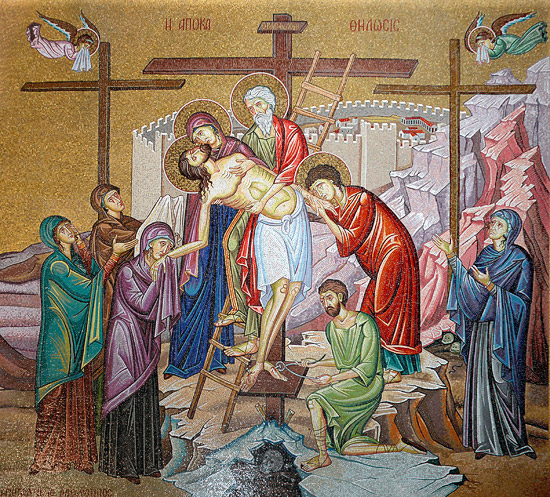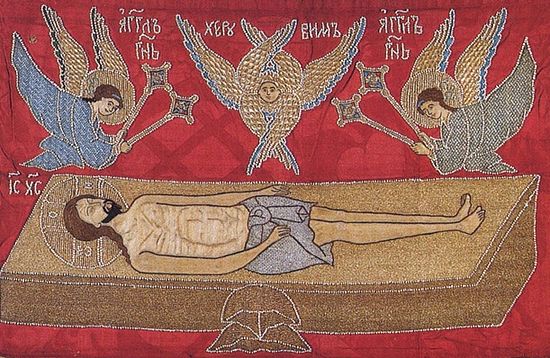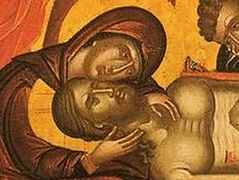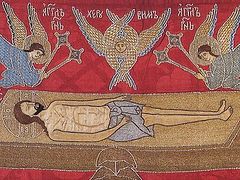Now if we have died with Christ, we believe that we shall also live with him (Rom. 6:8)
 The Taking Down From the Cross. Mosaic from the Church of the Holy Sepulchre in Jerusalem. Photo: A.Pospelov / Pravoslavie.ru
The Taking Down From the Cross. Mosaic from the Church of the Holy Sepulchre in Jerusalem. Photo: A.Pospelov / Pravoslavie.ru These are the words of the holy apostle Paul, which we heard today at the Divine Liturgy in the Epistle reading, my beloved brothers and sisters in Christ. It is salvific for us, first and foremost, to know what it means to die with Christ.
Of course, clearly death here is not bodily, for the apostle used the word “died” in relation to living people, but death to the world means to the passions. The same apostle speaks about this in his Epistle to the Galatians: And they that are Christ's have crucified the flesh with the affections and lusts (Gal. 5:24). It is clear from this that we die with Christ only if we mortify our passions of gluttony, fornication, avarice, anger, sorrow, despondency, vanity, and pride. The mortification of the passions is an ascetic labor that can be called voluntary martyrdom. Thus taught St. Theodore the Studite, saying that monks die daily through the cutting off of their passionate, sinful will. Therefore, they inherit crowns of martyrdom as do the holy martyrs.
True, these patristic words were spoken to monks. But the martyric struggle with the passions, in the thought of Apostle Paul, is unavoidable in the life of anyone who desires to be Christ-like. And indeed, how can it be otherwise, when the Lord commanded all of His followers on the narrow and thorny path, saying, And he that taketh not his cross, and followeth after me, is not worthy of me (Mt. 10:38). Thus, to live with Christ, we must first die with Him, that is, to slay the passions.
What does it mean to live with Christ? To live with Christ means to dwell with Him in unity; and unity with Christ is nothing other than our love for Him, the desire of our hearts to ever contemplate Him, to ever prayerfully converse with Him, and to do only that which is pleasing to Him. Love for Christ, as the Lord Himself teaches, is, in essence, our keeping of His Divine commandments: If ye love me, keep my commandments (Jn. 14:15). Therefore, let us obey His commandments.
We will live with Christ if our lives manifest the fruit of obeying all of His commandments, which is the Divine joy of Christ, of which He speaks: If ye keep my commandments, ye shall abide in my love… that my joy might remain in you, and that your joy might be full (Jn. 15:10-11).
The joy of Christ is served in particular, like nowhere else, to all His true followers in the Mystery of Holy Communion. Making us one with God by grace, this Mystery gives us, while yet in our earthly lives, heavenly, paradisiacal blessedness. And if we do not experience this blessedness from Holy Communion, which the holy saints of God felt, it is only because we poorly observe the saving commandments, and do not want to part with our passions and put them to death within ourselves.
Therefore, let us, my beloved children in Christ, have as our chief care the firm determination to battle with the passions until their eradication. Then we will live with Christ, that is, will unflinchingly fulfill all of His commandments, and possess their fruit while yet here on earth—Divine joy, drawn from the many blessed sources of our Orthodox Church, especially from the Mystery of the holy Eucharist.
We will experience the fullness of this joy over the destruction of our passions and the fulfilling of the Divine commandments in the future life, when we will unite forever with the Lord Who died and resurrected for us, for unending blessedness in His Heavenly Kingdom, which, may the Lord vouchsafe us in His ineffable mercy towards us sinners. Amen.




